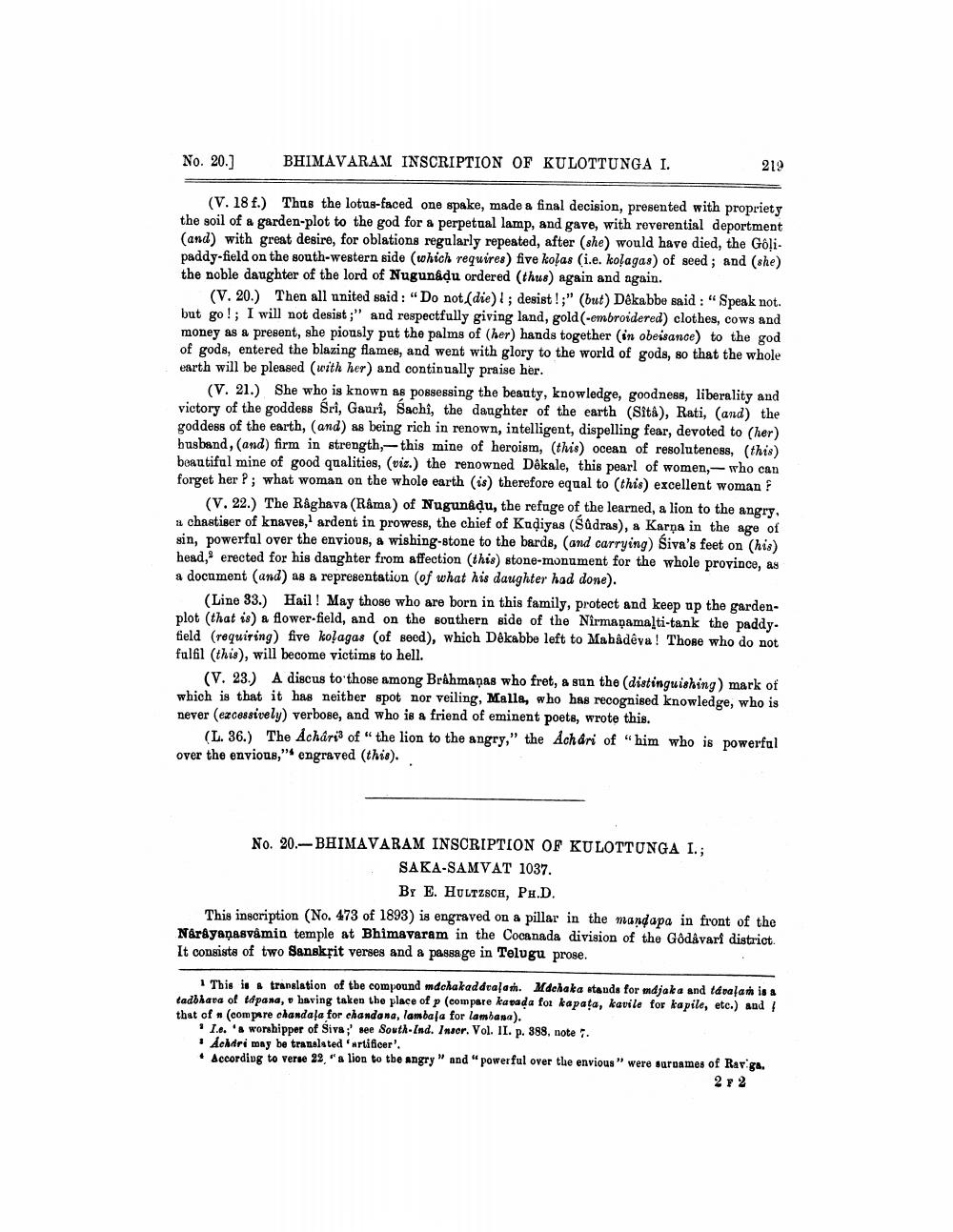________________
No. 20.)
BHIMAVARAM INSCRIPTION OF KULOTTUNGA I.
219
(V. 18 f.) Thus the lotus-faced one spake, made a final decision, presented with propriety the soil of a garden-plot to the god for a perpetual lamp, and gave, with roverential deportment (and) with great desire, for oblations regularly repeated, after (she) would have died, the Goļi. paddy-field on the south-western side (which requires) five kolas (i.e. kolagas) of seed; and (she) the noble daughter of the lord of Nugunadu ordered (thus) again and again.
(V. 20.) Then all united said: "Do not (die); desist!;" (but) Dekabbe said: "Speak not. but go!; I will not desist;" and respectfully giving land, gold (-embroidered) clothes, cows and money as a present, she piously put the palms of (her) hands together (in obeisance) to the god of gods, entered the blazing flames, and went with glory to the world of gods, so that the whole earth will be pleased (with her) and continually praise her.
(V. 21.) She who is known as possessing the beauty, knowledge, goodness, liberality and victory of the goddess Sri, Gauri, Sachi, the daughter of the earth (Sita), Rati, (and) the goddess of the earth, (and) as being rich in renown, intelligent, dispelling fear, devoted to (her) husband, (and) firm in strength, - this mine of heroism, (this) ocean of resoluteness, (this) beautiful mine of good qualities, (viz.) the renowned Dôkale, this pearl of women,- who can forget her?; what woman on the whole earth (is) therefore equal to (this) excellent woman?
(V. 22.) The Raghava (Rama) of Nugungợu, the refuge of the learned, a lion to the angry, a chastiger of knaves, ardent in prowess, the chief of Kudiyas (Sudras), a Karna in the age of sin, powerful over the envious, a wishing-stone to the bards, (and carrying) Siva's feet on (his) head, erected for his daughter from affection (this) stone-monument for the whole province, as a document (and) as a representation of what his daughter had done).
(Line 33.) Hail! May those who are born in this family, protect and keep up the gardenplot (that is a flower-field, and on the southern side of the Nirmapamalti-tank the paddy. field (requiring) five kolagas (of seed), which Dekabbe left to Mabådêva! Those who do not fulfil (this), will become victims to hell.
(V. 23.) A discus to those among Brahmaņas who fret, a sun the distinguishing) mark of which is that it has neither spot nor veiling, Malle, who has recognised knowledge, who is never (excessively) verbose, and who is a friend of eminent poets, wrote this.
(L. 36.) The Achárið of "the lion to the angry," the Achári of " him who is powerful over the envious," engraved (this).
No. 20.-BHIMAVARAM INSCRIPTION OF KULOTTUNGA I.;
SAKA-SAMVAT 1037.
Br E. HULTZSCH, PH.D. This inscription (No. 473 of 1893) is engraved on a pillar in the mandapa in front of the Narayanasvåmin temple at Bhimavaram in the Cocanada division of the Godavari district. It consists of two Sanskrit verses and a passage in Telugu prose.
1 This is a translation of the compound mdohakadávalan. Mdchaka stands for udjak a and tavalan is a tadbhara of tapana, having taken the place of p (compare kanada for kapata, kavile for kapile, etc.) and ! that of compare chandala for chandana, lambala for lambasa).
Le worshipper of Siva;' see South-Ind. Inser. Vol. II. p. 388, note 7. • Achdri may be translated Artificer'. • According to verse 22, "a lion to the Angry" and "powerful over the envious" were surnames of Rav.g.
27 2




